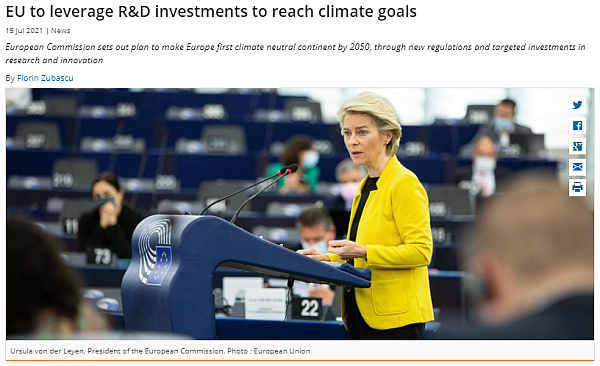Press EU to leverage R&D investments to reach climate goals
EU research and innovation programmes are set to contribute significantly to the European Commission’s lofty plan to cut greenhouse gas emissions by 55% by 2030, according to new legislation tabled to make the ‘Green Deal’ a reality.
The Commission wants Europe to become the first climate neutral continent by 2050. For that to happen, it needs to cut down emissions in less than a decade by investing in new technologies for carbon capture and renewable fuels, and making food production less damaging to the environment.
Commission president Ursula von der Leyen was joined on Wednesday by a band of no less than six commissioners to present a bundle of new laws that would impose stricter national limits on gas emissions and ban the sale of internal combustion engines by 2035. EU companies will also be taxed for the greenhouse gases they release into the atmosphere. Imports will be subject to greenhouse gas tariffs as well.
To make the plan work, the EU needs to invest heavily in research and development of new technologies.
Car makers will soon need to roll out vehicles with electric or hydrogen propulsion, new and buildings and renovations projects will have to include less carbon-intensive heating and cooling technologies, while energy intensive industries like steel production are required to replace coking coal with electricity from renewable energy and hydrogen.
For all that, Von der Leyen said the EU will rely on its “most precious renewable in the world”, its scientific and technological prowess. “Europe has always been the continent of scientists and innovators,” she said.
“Research and innovation are fundamental if we want to turn the Green Deal into reality, while creating opportunities and new jobs”, said Portuguese MEP Maria da Graça Carvalho, European Parliament negotiator for research partnerships in Horizon Europe.
The EU has allocated 35% of the funding available through Horizon Europe for green investments. A string of research partnerships and missions will also provide funding to develop new technologies needed in the green transition.
In Horizon Europe, a research mission on smart cities aims to make 100 cities climate neutral by 2030. Research partnerships with industry and member states will provide funding for R&D in clean energy, a new generation of batteries and hydrogen. Around half of the budget allocated to global challenges and industrial competitiveness in Horizon Europe will be dedicated to these partnerships.
The EU will provide €10 billion of funding and the private sector partners will match that figure with at least an equivalent amount. “All of these partnerships have the potential to make a difference,” said Carvalho.
Energy research associations say a lot of the new technologies needed to meet the proposed goals are still being developed and a swifter timeline for widespread adoption is required. “While the transition will require massive and accelerated research and innovation investments for delivering the needed clean technologies, half of which are still in development or in their infancy, transitioning to net-zero will require a fast transformational change in all aspects of our society,” said Adel El Gammal, secretary general of the European Energy Research Alliance.
Davide Sabbadin, senior policy office at the European Environmental Bureau (EBB) says the Commission is overly confident in the potential of hydrogen and biomass to decarbonise industrial sectors. “The environmental impacts of these expensive and rare resources are overlooked, while a broader perspective of decarbonisation, by saving emissions via the circular economy and rethinking production and consumption patterns, is largely dismissed,” he said.
